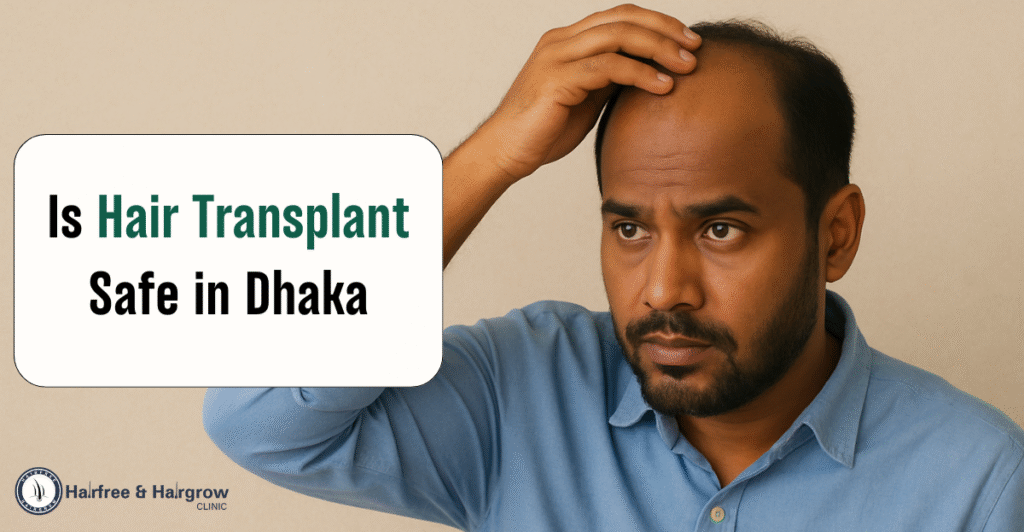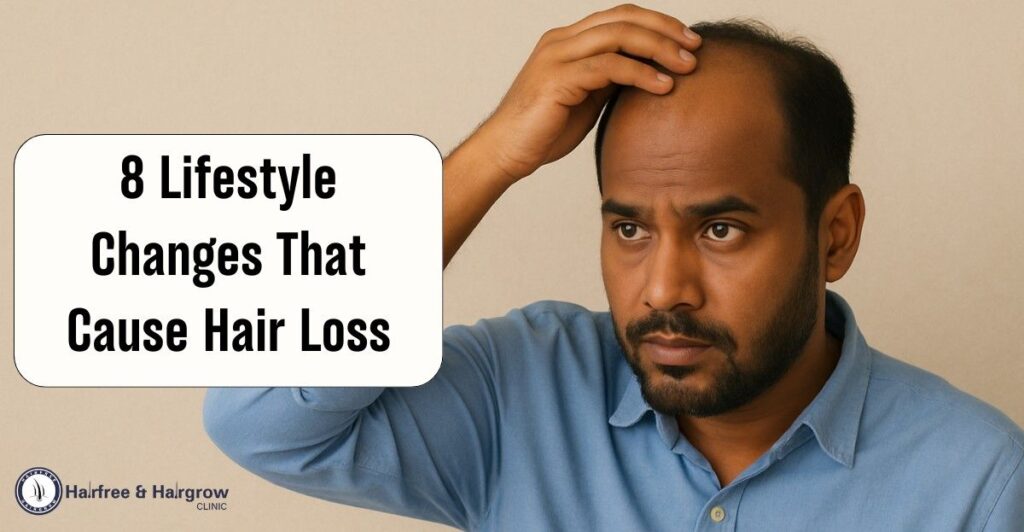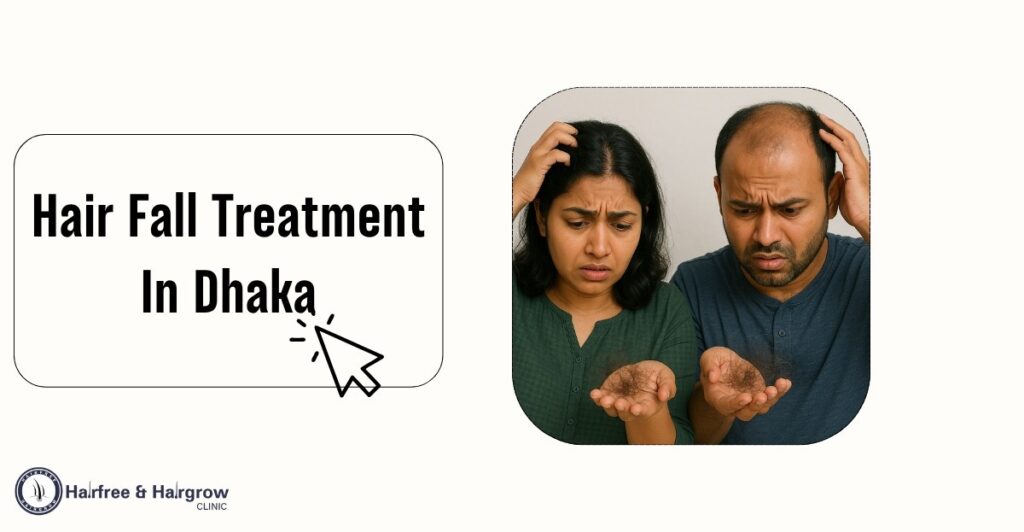Hair loss is a common concern for millions of men and women globally. While genetics, age, and hormonal imbalances are well-known culprits, many people are unaware of another critical yet often overlooked factor: smoking.
Table of Contents

Can Smoking Cause Hair Loss: What the Research Says
Yes, smoking increases the risk of hair loss in most people. If you have androgenetic alopecia, also known as pattern baldness, you are more likely to experience male pattern baldness.
Numerous studies have suggested a strong correlation between smoking and increased risk of hair loss, especially in individuals with a genetic predisposition. Some research indicates that smokers are more likely to experience early-onset male and female pattern baldness compared to non-smokers.
Let’s break down how this happens.
1. Poor Circulation to the Scalp
One of the most direct ways smoking impacts hair health is by reducing blood circulation. Tobacco smoke contains nicotine and carbon monoxide, both of which cause blood vessels to constrict and harden over time. This reduced blood flow limits oxygen and essential nutrients delivery to the hair follicles.
Hair follicles are highly sensitive to changes in oxygen and nutrient supply. When deprived, they begin to shrink, enter the resting phase prematurely, and eventually stop producing healthy hair. This process is known as follicular miniaturization, a key feature in many types of hair loss.
2. Damage to Hair Follicle DNA
Cigarette smoke contains thousands of harmful chemicals and free radicals that generate oxidative stress in the body. These free radicals attack healthy cells and damage DNA-including the cells responsible for hair growth. Over time, this leads to structural weakening of the hair strands and a shortened hair growth cycle.
When hair follicles experience oxidative damage repeatedly, they can enter a dormant state or die altogether, contributing to permanent hair loss if not addressed early.
3. Hormonal Disruption and Inflammation
Smoking can also disrupt the delicate balance of hormones in the body. It has been found to influence levels of androgens-hormones like testosterone and dihydrotestosterone (DHT)-which are known to contribute to androgenetic alopecia (pattern baldness) in both men and women.
In addition, smoking increases systemic inflammation, which can interfere with the normal function of hair follicles and worsen existing scalp conditions such as dermatitis or psoriasis. An inflamed scalp environment is far less conducive to healthy hair growth.
4. Accelerated Aging of Hair and Scalp
Another side effect of smoking is that it accelerates the aging process of the skin, including the scalp. This can lead to increased dryness, loss of elasticity, and reduced ability to regenerate healthy cells. A prematurely aged scalp is less likely to support strong, vibrant hair growth.
Additionally, smoking depletes collagen and vitamin C-both essential for maintaining healthy hair structure and follicle support.
5. Disruption of the Natural Hair Growth Cycle
The hair growth cycle consists of three main phases: anagen (growth), catagen (transition), and telogen (resting). A healthy scalp maintains a balance between these phases. However, smoking has been shown to push more hair into the telogen phase, producing telogen effluvium, a condition characterized by excessive hair shedding and thinning.
This type of hair loss is often temporary but can become chronic if the underlying habits, like smoking, are not addressed.
Is Hair Loss from Smoking Reversible?
The good news is that if addressed early, some smoking-related hair loss can be reversible. Quitting smoking helps restore normal blood circulation, reduce oxidative stress, and rebalance hormone levels-creating a more favorable environment for hair regrowth.
However, if follicles have been severely damaged or have entered a prolonged dormant state, regrowth may be limited. That’s why early intervention is key.
After quitting, improvements in hair health may become noticeable within 3 to 6 months, depending on the individual’s age, genetics, and lifestyle. Supportive treatments like topical minoxidil, laser therapy, proper nutrition, and stress management can accelerate the healing process.
Practical Tips to Support Hair Recovery After Quitting Smoking
- Improve Your Diet: Focus on antioxidant-rich foods like berries, spinach, and nuts to combat oxidative damage.
- Hydrate: Drink plenty of water to support circulation and detoxification.
- Scalp Massage: Boost blood flow to the hair follicles with regular gentle massages.
- Use Mild Hair Products: Avoid harsh shampoos and opt for products that nourish and protect the scalp.
- Consult a Hair Specialist: Consider a doctor’s assessment to identify the best treatment options based on your hair type and condition.
Conclusion
Smoking is a major, yet often overlooked, factor contributing to hair loss. By impairing circulation, damaging follicle DNA, disrupting hormonal balance, and accelerating scalp aging, smoking creates a hostile environment for healthy hair growth.
If you’re struggling with hair loss and are a smoker or former smoker, addressing this habit could be a transformative first step toward restoring not only your hair but your overall health.
Quitting smoking isn’t just a decision for your lungs or heart, it’s a decision that supports every cell in your body, including those responsible for the strength, color, and vitality of your hair.

Written By
Medical Officer & Hair Transplant Surgeon
Dr. Nazmin Sultana Nipa is a distinguished hair transplant doctor in Bangladesh, known for her advanced skills in hair restoration. As a Medical Officer and Hair Transplant Surgeon, Dr. Nipa combines her extensive experience in the field with a focus on transparency and patient-centered care.
Disclaimer
We’ve made all possible efforts to ensure that the information provided here is accurate, up-to-date and complete, however, it should not be treated as a substitute for professional medical advice, diagnosis or treatment. See Detailed Disclaimers Here.




